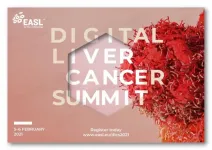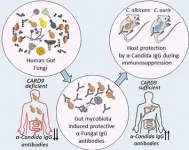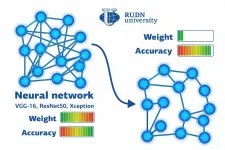Drug 'breakthrough' gives longest-ever survival in nonresectable liver cancer patients
The IMbrave150 trial found median overall survival was 19.2 months in patients treated with atezo+bev vs 13.4 months for those treated with sorafenib alone, the current standard treatment
2021-02-06
(Press-News.org) 6 February: The IMbrave150 trial found median overall survival was 19.2 months in patients treated with atezo+bev vs 13.4 months for those treated with sorafenib alone, the current standard treatment (HR, 0.66 [95% CI, 0.52-0.85]; P=0.0009). Survival at 18 months was 52% with atezo+bev and 40% in patients treated with sorafenib.
All patients in the trial had nonresectable HCC - the most common form of liver cancer - and had not previously been treated with systemic therapy. A total of 501 patients were treated in the multicentre, open label, randomised controlled trial and the new follow-up figures confirm the superiority of the atezo+bev combination over sorafenib in this group of patients with HCC.
Atezolizumab is an immune checkpoint inhibitor drug, which helps the immune system hunt down and destroy cancer. Bevacizumab is a targeted monoclonal antibody therapy that starves tumours of their blood supply by preventing endothelial growth but also enhances the immune effects of atezolizumab.
The new data, presented today at the European Association for the Study of the Liver (EASL) Liver Cancer Summit 2021, follows the initial publication of trial data[i] with 8.6 months of follow-up which found survival at 12 months was 67.2% with atezo+bev, compared to 54.6% in those treated with sorafenib. This new post-hoc descriptive overall survival analysis included 12 months of additional follow-up from the primary analysis.
Prof. Richard Finn, lead author of the study, commented, "IMbrave150 showed consistent clinically meaningful treatment benefit and safety with an additional 12 months of follow-up. The combination provides the longest survival seen in a front-line Phase III study in advanced HCC, confirming atezo+bev as a standard of care for previously untreated, unresectable HCC."
"These are highly significant findings for the treatment of patients with HCC. Many thousands of patients worldwide could benefit from this treatment and it can be considered a major breakthrough - the first improvement in treatment for these types of cases in 13 years and a treatment long awaited by doctors."
The trial enrolled systemic treatment-naive patients with unresectable HCC, ?1 measurable untreated lesion (RECIST 1.1), Child-Pugh class A liver function and ECOG PS 0/1. Patients were randomised 2:1 to atezo 1200 mg IV q3w + bev 15 mg/kg IV q3w or sorafenib 400 mg bid until unacceptable toxicity or loss of clinical benefit per investigator. Patients were required to have an upper endoscopy within 6 months of starting the study, to assess for high-risk varices.
Survival benefit with atezo+bev vs sorafenib was generally consistent across subgroups and with the primary analysis. The updated objective response rate (ORR; 29.8% per RECIST 1.1) with atezo+bev was in line with the primary analysis, with more patients achieving complete response (CR; 7.7%) than previously reported. Safety was consistent with the primary analysis, with no new signals identified.
"We now need to understand what is next in front-line liver cancer and how will we build on this data to further improve outcomes beyond the 19.2 months we described. Additionally, we need to evaluate the efficacy for this regimen in earlier stages of HCC."
INFORMATION:
About Digital Liver Cancer Summit 2021
The two-day Digital Liver Cancer Summit 2021, building on EASL's success of Digital International Liver Congress™ 2020, puts delegates at the forefront of research, development, and strategies for treating patients. In a dynamic, exciting, interactive, digital environment.
Join Digital Liver Cancer Summit 2021 to get the absolute latest on basic, translational, and clinical data - including on hepatocellular carcinoma, cholangiocarcinoma, and rare primary liver cancers. The comprehensive updates offered at the summit will directly impact future clinical practice worldwide, because all the new data related to clinical trials will be presented to participants and discussed intensely. Digital Liver Cancer Summit 2021 is taking place 5-6 February 2021.
For more information on attendance and registration, please visit https://easl.eu/event/digital-liver-cancer-summit-2021/
About the European Association for the Study of the Liver (EASL)
EASL, the European Association for the Study of the Liver, founded in 1966, is a medical association dedicated to pursuing excellence in liver research, to the clinical practice of liver disorders, and to providing education to all those interested in hepatology. As of 2021, EASL serves more than 4,200 members.
EASL engages globally with all stakeholders in the field of hepatology, worldwide. Our aim is to spread knowledge and expertise in best practices and the latest scientific breakthroughs in this field. We advocate for the benefit of patients and advise European and national health authorities. EASL runs topical conferences, schools, and related educational meetings. Our journals, the Journal of Hepatology and JHEP Reports, provide an international forum for the publication of original articles, reviews, and letters to the Editor, describing the latest science in hepatology. Our eLearning hub, EASL Campus, offers more than 4,100 resources on hepatology and liver research. For more information, visit https://easl.eu/
EASL's flagship event, the International Liver Congress™ is taking place over four days, 23-26 June 2021. Members of the press are invited to make contact. For more information visit https://easl.eu/ilc2021
Contact
For more information, please contact the EASL Press Office at:
- Email: press@easloffice.eu
- Telephone: +44 (0) 208 154 6396
References
[i] Finn et al. Atezolizumab plus Bevacizumab in Unresectable Hepatocellular Carcinoma . N Engl J Med 2020;382:1894-905. DOI: 10.1056/NEJMoa1915745
[Attachments] See images for this press release:

ELSE PRESS RELEASES FROM THIS DATE:
2021-02-06
Around one in three working-age adults (29%) surveyed in France in July 2020 would refuse any COVID-19 vaccine.
Willingness to receive a COVID-19 vaccination depended upon its country of origin, effectiveness, rate of serious side effects, and site of vaccination.
Although attitudes may have changed since July 2020 with the approval of several vaccines and a second wave of COVID-19, the findings suggest that communicating the collective benefits of herd immunity reduced people's hesitancy about being vaccinated.
Nearly one in three working-age adults in France (29%) surveyed in July 2020 - when lockdown restrictions had been ...
2021-02-06
TORONTO (February 5, 2021) - A clinical study led by Dr. Jordan Feld, a liver specialist at Toronto Centre for Liver Disease, University Health Network (UHN), showed an experimental antiviral drug can significantly speed up recovery for COVID-19 outpatients - patients who do not need to be hospitalized.
This could become an important intervention to treat infected patients and help curb community spread, while COVID-19 vaccines are rolled out this year.
"This treatment has large therapeutic potential, especially at this moment as we see aggressive variants of the virus spreading around the globe which are less sensitive to both vaccines and treatment ...
2021-02-05
NEW YORK, NY (Feb. 5, 2020)--Cells used to study the human blood brain barrier in the lab aren't what they seem, throwing nearly a decade's worth of research into question, a new study from scientists at Columbia University Vagelos College of Physicians and Surgeons and Weill Cornell Medicine suggests.
The team also discovered a possible way to correct the error, raising hopes of creating a more accurate model of the human blood-brain barrier for studying certain neurological diseases and developing drugs that can cross it.
The study was published online Feb. ...
2021-02-05
Washington, DC, February 5, 2021 - A study in the Journal of the American Academy of Child and Adolescent Psychiatry (JAACAP), published by Elsevier, reports that in a diverse, cross-national sample of youth, physical discipline and cognitive deprivation had distinct associations with specific domains of developmental delay. The findings are based on the Multiple Indicator Cluster Surveys, which is an ongoing, international household survey initiative coordinated and assisted by the United Nations agency, UNICEF.
"Physical discipline and cognitive deprivation are well-established risks to child development. However, it is rare that these experiences are examined in relation to each other," said lead author ...
2021-02-05
UNIVERSITY PARK, Pa.-- When actor Tom Hanks announced his COVID-19 diagnosis on March 11, 2020, many Americans were still learning about the virus and its severity. According to new research, Hanks' announcement may have affected how some people understood the virus and their behavior toward its prevention.
The day after Hanks posted the news on social media, Jessica Gall Myrick, an associate professor in the Donald P. Bellisario College of Communications at Penn State, and Jessica Fitts Willoughby, associate professor at Washington State University, surveyed 682 people about their attitudes and behaviors toward COVID-19.
Just under 90% of the people surveyed had heard about Hanks' social ...
2021-02-05
Virtual reality isn't just for gaming. Researchers can use virtual reality, or VR, to assess participants' attention, memory and problem-solving abilities in real world settings. By using VR technology to examine how folks complete daily tasks, like making a grocery list, researchers can better help clinical populations that struggle with executive functioning to manage their everyday lives.
Lead author Zhengsi Chang is a PhD student that works in the lab of Daniel Krawczyk, PhD, deputy director of the Center for BrainHealth®. Along with Brandon Pires, a researcher at Texas Tech University Health Sciences Center, the team investigated whether VR can be used to effectively test ...
2021-02-05
New research affirms a unique peptide found in an Australian plant can destroy the No. 1 killer of citrus trees worldwide and help prevent infection.
Huanglongbing, HLB, or citrus greening has multiple names, but one ultimate result: bitter and worthless citrus fruits. It has wiped out citrus orchards across the globe, causing billions in annual production losses.
All commercially important citrus varieties are susceptible to it, and there is no effective tool to treat HLB-positive trees, or to prevent new infections.
However, new UC Riverside research shows that a naturally occurring peptide found in HLB-tolerant citrus relatives, such as Australian finger lime, can not only kill the bacteria that causes the disease, it can also activate the plant's ...
2021-02-05
Common fungi, often present in the gut, teach the immune system how to respond to their more dangerous relatives, according to new research from scientists at Weill Cornell Medicine. Breakdowns in this process can leave people susceptible to deadly fungal infections.
The study, published Feb. 5 in Cell, reveals a new twist in the complex relationship between humans and their associated microbes, and points the way toward novel therapies that could help combat a rising tide of drug-resistant pathogens.
The new discovery stemmed from work on inflammatory bowel disease, which often causes patients to carry larger than normal populations of fungi in their guts. ...
2021-02-05
To arrive at Nunavut, turn left at the Dakotas and head north. You can't miss it--the vast tundra territory covers almost a million square miles of northern Canada. Relatively few people call this lake-scattered landscape home, but the region plays a crucial role in understanding global climate change. New research from Soren Brothers, assistant professor in the Department of Watershed Sciences and Ecology Center, details how lakes in Nunavut could have a big impact on carbon dioxide levels in the atmosphere, and it's not all bad news--at least for now. Brothers examined 23 years of data from lakes near Rankin Inlet. He noted a peculiarity--as the lakes warmed, their carbon dioxide concentrations fell. ...
2021-02-05
A team of mathematicians from RUDN University found a way to reduce the size of a trained neural network six times without spending additional resources on re-training it. The approach is based on finding a correlation between the weights of neural connections in the initial system and its simplified version. The results of the work were published in the Optical Memory and Neural Networks journal.
The structures of artificial neural networks and neurons in a living organism are based on the same principles. Nodes in a network are interconnected; some of them receive a signal, and some transmit it by activating or suppressing the next element in the chain. The processing of any signal (for ...
LAST 30 PRESS RELEASES:
[Press-News.org] Drug 'breakthrough' gives longest-ever survival in nonresectable liver cancer patients
The IMbrave150 trial found median overall survival was 19.2 months in patients treated with atezo+bev vs 13.4 months for those treated with sorafenib alone, the current standard treatment




